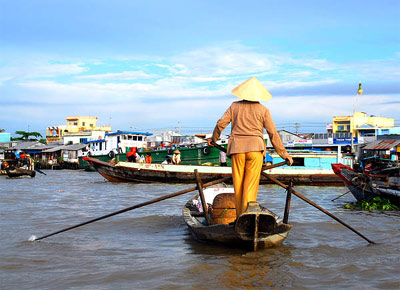Tailor Made Holidays with our travel experts
We'll do our best to call you within 48h

Riverside Food Market
Dine at the riverside food market, a hot spot for Can Tho residents, and a wonderful place to sample some of the region’s authentic local cuisine. Test your taste buds with exotic specialties like minced snake and roasted sparrow.
Shopping
Shop for souvenirs in Can Tho’s many markets. Along the river lies the Ninh Kieu Tourist Market, located in a lovely old market hall and encapsulated by a garden. Xuan Khanh Market, formerly known as Tam Thuong Market, features vegetables, fruits, and fresh food. Cai Khe Market features a variety of foodstuffs and other wholesale products, from textiles to home appliances.
Floating Markets
Floating markets include Cai Rang, Phong Dien, Phung Hiep and Tra On. Cai Rang is the main floating market and opens at 5:30 a.m, and we advise an early start to make the most of one of Vietnam's most spectacular sights.
Quang Duc Pagoda
The Quang Duc Pagoda is one of the busiest in the area, and its premises are home to monks. Mornings are the best time to visit, before the heat of the midday sun sets in.
Khmer Architecture
Built in the architectural style of the Khmer empires of Cambodia, Munirangsyaram Pagoda possesses ornate, tiered roofs, elaborate carvings finished in gold, and a 5 foot (1.5 meter) tall statue of Siddhartha Gautam, the founder of Buddhism.
Xuan Khanh Quarter
At the center of the city lies Xuan Khanh, an enclave of markets and restaurants originally named for an 18th century general who fought invading armies from Siam. Within Xuan Khanh is the student quarter, frequented by students from nearby Can Tho University; “Hot Pot Alley,” which features a dozen-odd hot pot restaurants, wherein groups of diners cook raw ingredients in a giant, bubbling pot of boiling soup; and Mau Than Street, a long, 18 mile (30 kilometer) street that is home to markets, churches, and pagodas.
Lunch with a Local Family
Sit down to lunch with a local family, and learn about the customs and practices - including the unique tradition of mouse hunting. Once used by inhabitants of the area to supplement their diets, the process involves climbing coconut trees to find mice, and using dogs below to catch any that fall.